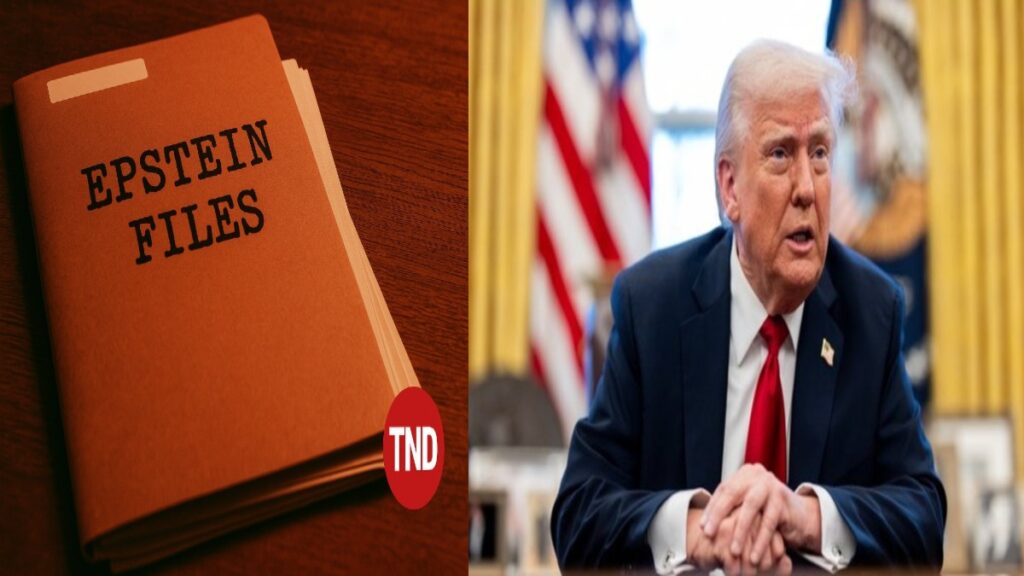
Washington – The recent unsealing of the Epstein files has once again ignited public outrage, political tensions, and widespread demands for accountability. With the release of Phase 1 documents by the Department of Justice (DOJ) and the Federal Bureau of Investigation (FBI), new light has been shed on the notorious Jeffrey Epstein case. Despite a highly anticipated disclosure, the public remains unsatisfied, with many still asking: where is the Epstein client list? Are powerful names being protected? What else is buried deep in sealed vaults and bureaucratic red tape?
This in depth article from The News Drill explores the Epstein files an overview of recent updates, contents of the released documents, reactions from Congress, legal complexities, and what we can expect in the coming months.
What Are the Epstein Files?
The “Epstein files” refer to thousands of pages of investigative documents, flight logs, evidence records, contact books, and victim testimonies gathered over decades about the crimes of financier and convicted sex offender Jeffrey Epstein. Following his arrest in 2019 and subsequent death in a New York jail, pressure mounted on U.S. law enforcement agencies to disclose the full extent of Epstein’s operations and the individuals involved.
The files became symbolic of elite impunity, with rumors about global politicians, celebrities, and businessmen being implicated in Epstein’s network. Until 2025, much of this material remained sealed or heavily redacted, fueling speculation and distrust.
Phase 1: What Was Released in February 2025?
In a major announcement on February 27, 2025, the DOJ and FBI jointly released Phase 1 of the Epstein files. This tranche included:
- Epstein’s flight logs, documenting private jet travel to and from his properties.
- A redacted version of his contact book, often referred to as the “black book,” containing hundreds of names.
An evidence list from searches of Epstein’s properties, including:
- CDs labeled with titles like “girl pics nude”
- Dozens of USB drives and hard drives
A redacted list of “masseuses,” including over 250 names many underage.
The materials were deeply disturbing but failed to provide the smoking gun the public had long anticipated: a definitive list of clients or co-conspirators.
No Client List Found, Says FBI
In July 2025, a DOJ internal memo stated unequivocally that no official Epstein client list exists. After reviewing thousands of documents, the FBI found “no credible evidence” of a compiled client list used for blackmail or extortion.
This revelation, or lack thereof, sparked fierce backlash on social media and from members of Congress. Critics argue that the absence of such a list is either an oversight or a deliberate act to shield powerful individuals.
Political Fallout: Congress in Turmoil
The political ramifications of the Epstein files are immense. In July 2025, House Speaker Mike Johnson abruptly ended the congressional session, allegedly to avoid a vote on unsealing the full contents of the Epstein investigation. This led to bipartisan outrage.
Rep. Thomas Massie (R-KY) and Dem. Ro Khanna (D-CA) introduced a bill demanding full declassification of all Epstein related materials.
A September vote is expected, with growing pressure on lawmakers to support transparency.
According to internal leaks, some GOP members fear political blowback if names associated with the party are exposed. Similarly, Democrats are also cautious, as Epstein had ties across the political aisle.
Calls for Maxwell Testimony
One of the most vocal demands from legal experts and lawmakers is for Ghislaine Maxwell, Epstein’s longtime associate, to testify under oath. Maxwell is currently serving a 20 year sentence for sex trafficking and conspiracy.
Prominent attorney Alan Dershowitz a former Epstein lawyer has called for immunity in exchange for testimony, claiming that Maxwell holds the key to unlocking the remaining mysteries of the Epstein files.
Deputy Attorney General Todd Blanche recently confirmed the DOJ is planning a prison interview with Maxwell, raising hopes of a potential breakthrough.
Financial Records Under Scrutiny
Senator Ron Wyden (D-OR) made headlines by revealing that the U.S. Treasury is sitting on more than 4,700 flagged wire transfers involving Epstein linked accounts, totaling $1.1 billion. These transactions were marked as suspicious by various banks and may reveal connections to unnamed individuals.
However, the Treasury denies it is withholding information, claiming that investigations are ongoing and disclosure at this stage could jeopardize case integrity.
This monetary trail could expose the real financial infrastructure that allowed Epstein to operate with impunity for decades.
Did FBI Suppress Trump Mentions?
In a bombshell claim, Senator Dick Durbin (D-IL) alleged that FBI agents were instructed to flag or suppress references to Donald Trump during the document review process.
Durbin cited internal memos and whistleblower testimony suggesting that agents were told to “de-emphasize politically sensitive names” to avoid public uproar during the 2024 election cycle.
While the DOJ denies any such directive, the allegation has given rise to bipartisan calls for an independent inquiry into the FBI’s handling of the Epstein files.
DOJ’s Position on Further Disclosure
Attorney General Pam Bondi, appointed under the Trump administration, supports further transparency but insists that victim privacy and legal constraints must guide the process.
The DOJ has indicated willingness to declassify grand jury transcripts, provided they receive court approval. However, victims’ rights advocates warn that careless disclosures could retraumatize survivors.
Media Reactions and Public Sentiment
News outlets from across the political spectrum have weighed in on the Epstein files:
- Mainstream media has largely focused on the contents of the Phase 1 release, avoiding speculation about unconfirmed names.
- Independent outlets and online investigators argue that the real bombshells remain hidden and accuse the government of slow walking disclosures.
Public sentiment remains volatile. #EpsteinFiles has consistently trended on social media platforms since February, with many expressing outrage at what they perceive as elite protectionism.
What’s Next?
The next few months could prove critical:
- Congress returns in September, with a potential vote on the full declassification of the Epstein files.
- The DOJ’s meeting with Ghislaine Maxwell could yield new names and evidence.
- Senator Wyden continues to push for full disclosure of Treasury Department financial data.
- Transparency vs. privacy will remain the central legal and ethical tension.
If Congress votes in favor of total release, the resulting fallout could shake major institutions and public figures.
Conclusion
The Epstein files have become more than just documents they are a symbol of a broken system where power often evades justice. While the Phase 1 release offered a glimpse into the sordid world Jeffrey Epstein inhabited, the full truth remains locked away.
With congressional momentum building and public pressure mounting, the coming months may finally bring some long awaited answers. But whether those answers will satisfy the public’s demand for accountability or simply deepen the mystery remains to be seen.
Stay tuned with The News Drill for the latest updates on the Epstein files and related developments.















